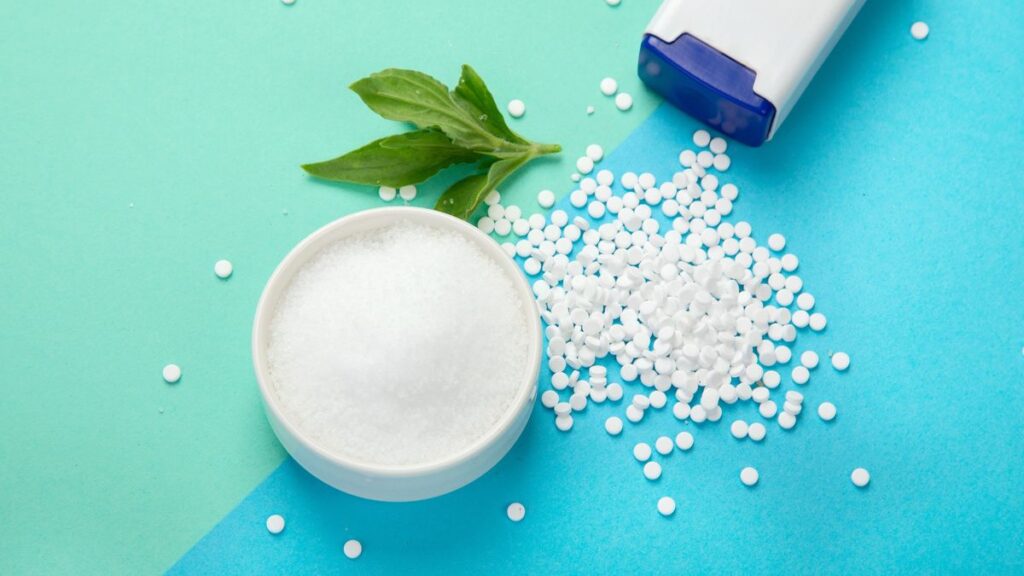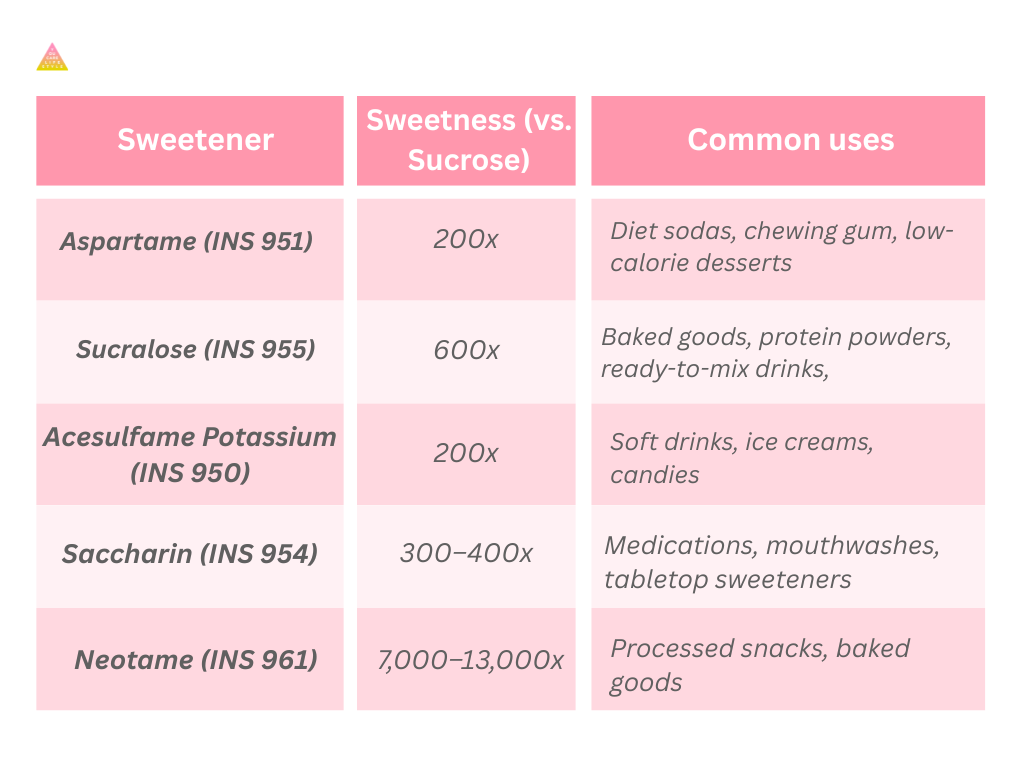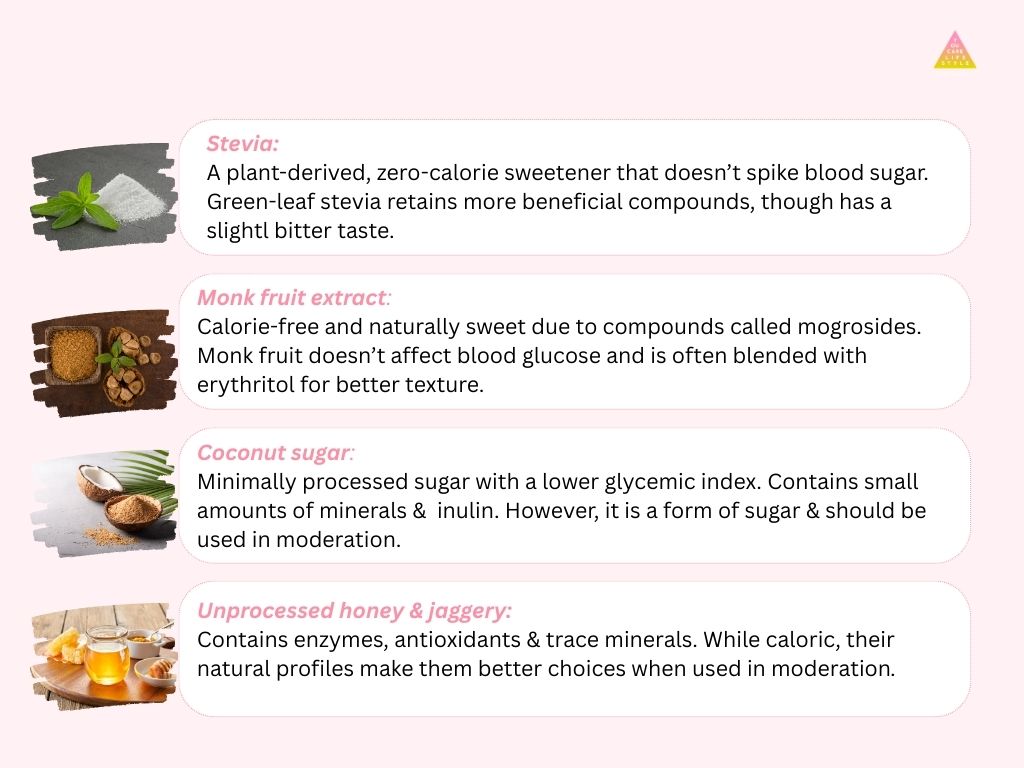Zero calories, zero clarity: The sweet illusion

It’s often assumed that anything labelled “sugar-free” or “zero calorie” is automatically better. Especially when it’s wrapped in shiny wellness branding and promises of guilt-free indulgence.
Framed as healthier alternatives to sugar, artificial sweeteners are marketed as the smarter choice for weight loss and blood sugar control. But the conversation around their long-term impact is far from settled.
This blog takes a closer look at artificial sweeteners and why it’s worth paying more attention to what’s behind the “sugar-free” tag.
What are artificial sweeteners?
Artificial sweeteners are chemically synthesised sugar substitutes that replicate the sweetness of sucrose with minimal to zero caloric load. Most of them are non-nutritive, meaning they provide sweetness without contributing to energy intake and are often 200 to 700 times sweeter than table sugar.
From a metabolic perspective, these compounds do not undergo typical glycolytic breakdown. Instead, they either pass through the digestive system unchanged or are metabolised via alternate pathways that don’t significantly affect blood glucose or insulin response.
This makes them especially popular in formulations targeting weight management, diabetes care, and low-carb or ketogenic diets.
A look at FSSAI-approved sweeteners
The Food Safety and Standards Authority of India (FSSAI) permits certain artificial sweeteners in packaged foods and beverages. Each of these comes with a safety benchmark known as the Acceptable Daily Intake (ADI), a maximum amount considered safe to consume daily over a lifetime.

These sweeteners are widely present in products marketed as “sugar-free,” “diet-friendly,” or “zero calorie.” While small amounts may seem harmless, concerns lie in long-term exposure and their effects on gut health, metabolism, and overall well-being.
The Not-So-Sweet Side: What the Research Reveals
Artificial sweeteners may promise fewer calories and better blood sugar control but growing research suggests that their long-term effects may not be as harmless as they seem.
1) Disrupted glucose response: Research shows that saccharin can alter gut microbiota, leading to impaired glucose tolerance, ironically increasing the risk of metabolic issues they’re meant to prevent (Iizuka, Nutrients, 2022).
2) Impact on gut health: Sucralose and aspartame have been found to reduce beneficial gut bacteria and alter microbial diversity. Over time, this could impact digestion, immunity and inflammation (Conz, Salmona, & Diomede, Nutrients, 2023).
3) Metabolic mismatch: By triggering sweet taste receptors without delivering actual calories, these compounds may confuse the body’s regulatory systems, leading to increased cravings, reduced satiety, and insulin dysregulation (Wilk et al., Nutrients, 2022).
4) Neurological concerns: Aspartame has been studied for its potential effects on mood and brain health. Some evidence links high intake to headaches, irritability and even anxiety in sensitive individuals (Dar, International Immunopharmacology, 2024).
5) The illusion of control: “Diet” foods often create a psychological loophole, people may overcompensate by eating more later, thinking they’ve “saved” calories earlier. This can undermine overall health goals.
A smarter kind of sweet
The issue isn’t just what we use to sweeten our food but why we feel the need to sweeten everything in the first place.
Modern diets are wired for hyper-palatable foods and sweeteners (natural/ artificial) fuel that dependency. Instead of replacing sugar with its synthetic variants, the more sustainable solution may lie in recalibrating our taste buds and reducing the overall sweet cravings.
That said, for those moments when a touch of sweetness feels necessary, there are more mindful alternatives available:

Be Informed, Not Influenced!
In the race to go “sugar-free,” we’ve handed our choices to shiny labels and clever marketing without always questioning what’s inside. But it’s time to pause. Read labels, ask questions and understand what those ingredients mean for your body.
Artificial sweeteners may offer a quick fix, but long-term health isn’t built on shortcuts. Most of us consume products without knowing their ingredients or the possible side effects they carry.
At YouCare Lifestyle, we believe that cleaner choices shouldn’t be confusing. That’s why our Pink Tiger Verified products are free from harmful additives, including artificial sweeteners. Each product goes through rigorous checks to ensure safety and transparency so you can trust what you bring home.
Disclaimer: This content is for informational purposes only and is not a substitute for professional medical advice, diagnosis or treatment. Always consult your healthcare provider before trying any new food items, supplements, or products.
References
1) Ghusn, W., Naik, R., & Yibrin, M. (2023). The Impact of Artificial Sweeteners on Human Health and Cancer Association: A Comprehensive Clinical review. Cureus. https://doi.org/10.7759/cureus.51299
2) Debras, C., Chazelas, E., Sellem, L., Porcher, R., Druesne-Pecollo, N., Esseddik, Y., De Edelenyi, F. S., Agaësse, C., De Sa, A., Lutchia, R., Fezeu, L. K., Julia, C., Kesse-Guyot, E., Allès, B., Galan, P., Hercberg, S., Deschasaux-Tanguy, M., Huybrechts, I., Srour, B., & Touvier, M. (2022). Artificial sweeteners and risk of cardiovascular diseases: results from the prospective NutriNet-Santé cohort. BMJ, e071204. https://doi.org/10.1136/bmj-2022-071204
3) Iizuka, K. (2022). Is the Use of Artificial Sweeteners Beneficial for Patients with Diabetes Mellitus? The Advantages and Disadvantages of Artificial Sweeteners. Nutrients, 14(21), 4446. https://doi.org/10.3390/nu14214446
4) Conz, A., Salmona, M., & Diomede, L. (2023). Effect of Non-Nutritive Sweeteners on the gut microbiota. Nutrients, 15(8), 1869. https://doi.org/10.3390/nu15081869
5) Wilk, K., Korytek, W., Pelczyńska, M., Moszak, M., & Bogdański, P. (2022). The effect of artificial sweeteners use on sweet taste perception and weight loss efficacy: a review. Nutrients, 14(6), 1261. https://doi.org/10.3390/nu14061261
6) Dar, W. (2024). Aspartame-induced cognitive dysfunction: Unveiling role of microglia-mediated neuroinflammation and molecular remediation. International Immunopharmacology, 135, 112295. https://doi.org/10.1016/j.intimp.2024.112295
7) Arshad, S., Rehman, T., Saif, S., Rajoka, M. S. R., Ranjha, M. M. a. N., Hassoun, A., Cropotova, J., Trif, M., Younas, A., & Aadil, R. M. (2022). Replacement of refined sugar by natural sweeteners: focus on potential health benefits. Heliyon, 8(9), e10711. https://doi.org/10.1016/j.heliyon.2022.e10711
8) FOOD SAFETY AND STANDARDS (LABELLING AND DISPLAY) REGULATIONS, 2020 https://fssai.gov.in/upload/uploadfiles/files/Compendium_Labelling_Display_04_01_2022.pdf
9) SUBSTANCES ADDED TO FOOD (FSSAI) https://www.fssai.gov.in/upload/uploadfiles/files/18_%20Chapter%203%20(Substances%20added%20to%20food)_compressed.pdf